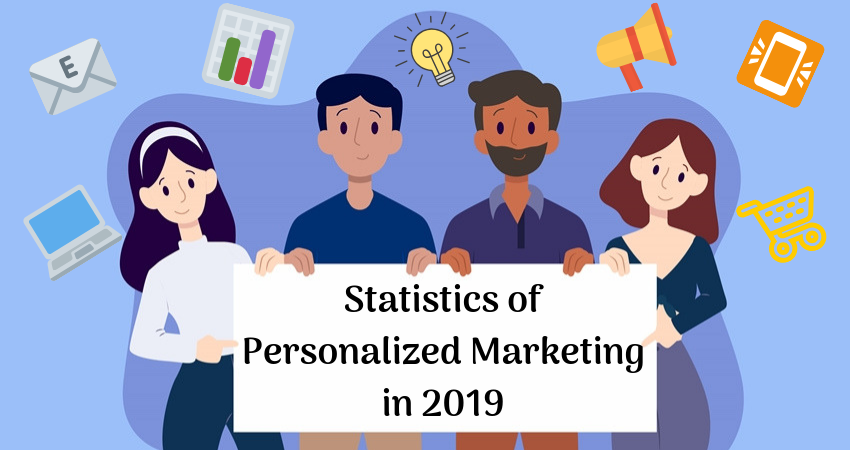Personalized marketing, also known as one-to-one marketing or individual marketing, it is a marketing strategy by which companies deliver individualized messages and product to prospective customers through data collection, analysis, and the use of automation technology.
Through personalization, a company can integrate into different types of marketing medium, such as social media, blogs, and email, to generate better results.
It involves collecting data related to the potential customer and crafting marketing experiences that target specific customers through the content.
Nowadays, customers are willing to share their personal information with their favorite brands to get personalized experiences.
They fill out forms, download whitepapers, and participate in surveys and expect the brands to protect this information. With all of this customer data being offered.
Personalization helps companies to create brand loyalty and love for the brand.
When consumers share their data and information with companies, they expect to be treated as individuals with specific preferences.
Retaining customers are not an easy task. With a lot of competition, the number of choices available to consumers, with that chance of switching to other brands increases.
Personalized marketing is one tool that can help marketers to retain their customers.
Personalization helps marketers to stand out from the crowd by creating unique content for individuals that leaves a special memory for customers and increase the relevance of their experience.
It’s important for marketers to create consistency across various channels as consumers are interacting with marketers or with brands across a number of channels including social media, email, mobile, etc. so, the in-store experience should match with the online experience.
Content personalization is the method used in digital marketing for delivering relevant content based on audience interests and motivations. It is more appealing and persuasive for the customers.
Big companies like Amazon, Coco-Cola, and Cadbury are using personalized content for engaging customers on an individual level and loyalty for years in the form of individual recommendations.
Content Personalization Statistics of 2019:
- 34% of customers are bound to make an unplanned purchase if a brand customizes content. (Source)
- 45% of buyers would relinquish content that’s displaying poorly on their devices. (Source)
- Shown by the report, 90% of marketers use digital platforms and content to approach their customers. (Source)
Content Personalization Stats & Trends from the previous year which continues to prevail in 2019 as well
- 87% of consumer’s survey stated that relevant content has a positive impact on consumers about how they feel about a brand. (Source)
- The absence of content relevancy creates 83% lower response rates in the average promoting effort. (Source)
- 78% of U.S. internet users said that personally relevant content from brands or companies increases their purchase activity. (Source)
A personalized email is an email sent by companies within their email content to tailoring email content to meet an individual’s interests and needs effectively.
It is proven that with email personalization there is an increase in open rates, derives much more revenue for the company.
Email Personalization Statistics of 2019:
- 55% of consumers said that they Like Emails containing relevant products and offers. (Source)
- 82% of marketers believe that it’s worthwhile to send emails with subject lines shorter than 60 characters.(Source)
- 54% of marketers send abandon cart emails. (Source)
Email Marketing Stats & Trends from the previous year which continues to prevail in 2019 as well
- Marketers believe that overall customer engagement rates can be increased by targeted personalization (Source)
- Birthday emails overpower standard promotional emails by generating higher revenue per email. (Source)
- Usage emoji in the mail subject lines observe a higher unique open rate as compared to text-only subject lines (Source)
Mobile personalization is the process of building and enhancing messages to meet the needs of specific audiences. Mobile phones are personal devices where the user tends to spend most of his time.
This is one of the best opportunities for marketers to promote the campaigns and proposition it effectively.
Mobile Personalization Statistics:
- 16% of U.K. consumers said they want to receive personalized messages. Out of that, they want a personalized message from travel-related companies (31%), consumer goods (41%), fashion brands and retailers (36%), and restaurants and bars (42%). (source)
- According to U.K. consumers, 46% of personalized message related to product interests them more. (source)
- More than half (52%) of U.K. consumers said they most of the time sigh up for the personalization. (source)
- 48% of consumer says that it is acceptable for the companies to use their purchase history to deliver them personalized message according to their interest via smartphones. (source)
- 66% of consumers said they get frustrated when their shopping cart is not linked with their mobile apps. (source)
Conclusion:
Nowadays, consumers are increasingly asking for more personalized products and services.
If brands or companies want to sustain or compete in the market, personalized marketing is the key to success. Personalization improves not only brand apps, user engagement, and retention, but also it in turn increases revenue.
You May Also Like To Read-
What Is Content Personalization? How it Helps in Improving Customer Experience?


